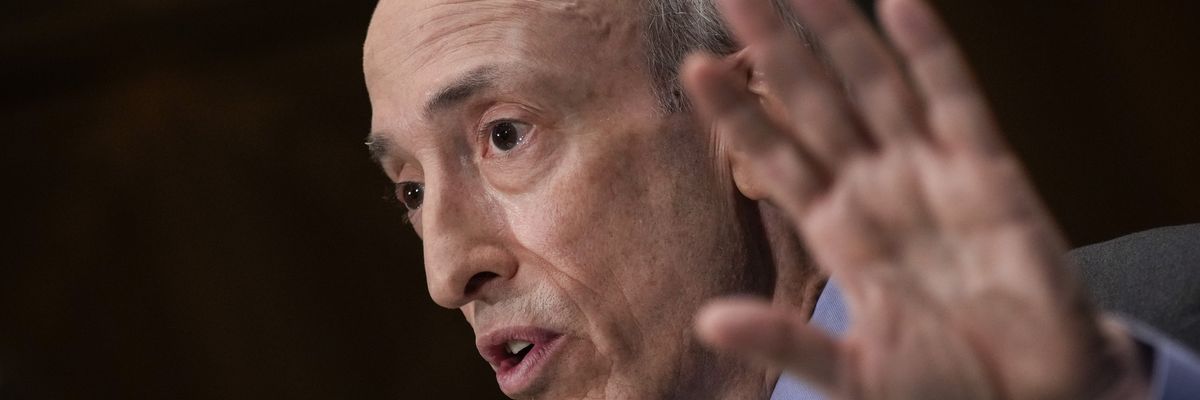The corporate flacks over at the U.S. Chamber of Commerce are clearly fretting about the growing movement to crack down on stock buybacks—and for good reason.
For years now, public outrage has been growing over rampant corporate spending on buybacks, a financial maneuver that generates huge windfalls for CEOs while siphoning resources from worker wages and productive investments. In response, federal officials have taken a series of whacks at this shady form of stock manipulation.
In 2020, Congress banned airlines that got pandemic relief aid from spending funds on stock buybacks. In 2022, federal lawmakers adopted a new excise tax on buybacks. That same year, the Biden administration announced plans to make it hard for buyback-spending companies to win a cut of new mega-billion-dollar semiconductor subsidies.
Then, in 2023, the Securities and Exchange Commission (SEC) issued a new rule that arguably poses the most direct threat to CEOs who’ve been milking the buyback scam. The regulation requires companies to increase buyback activity reporting from monthly to daily and to reveal whether top executives or directors bought or sold company shares during the four days before or after a buyback announcement.
None of these companies want to see their executives in the headlines for unloading boatloads of stock after a buyback announcement. At best, it would be embarrassing. At worst, it could be the beginning of the end of the buyback bonanza.
To be clear, this is just a disclosure regulation. No company would pay more in taxes or lose a lucrative government contract as a result of it. But America’s top corporate executives are not stupid when it comes to protecting their own paychecks. Stock-based pay makes up the vast bulk of their compensation. And they know what could happen if these reports show a pattern of executives timing their trades to profit from buyback-fueled bumps in share values. This damning data could build the case for restoring the effective ban on stock buybacks that existed until 1982, when President Ronald Reagan’s SEC legalized the maneuver. Not that we don’t already have ample evidence indicating that CEOs are opportunistically timing their trades around buybacks. A 2018 SEC investigation found that executives cash out much more of their personal stock immediately after announcing a buyback than on an ordinary day.
But that SEC study relied on non-public data. The new regulation would shine a bright light on individual corporate insiders who appear to be gaming buybacks to pad their own pockets.
The Chamber of Commerce Board of Directors is stacked with representatives of companies that have spent billions on buybacks in recent years, including Chevron, ConocoPhillips, Comcast, Hilton, Cognizant, and Pfizer. None of these companies want to see their executives in the headlines for unloading boatloads of stock after a buyback announcement. At best, it would be embarrassing. At worst, it could be the beginning of the end of the buyback bonanza.
Immediately after the SEC issued the new regulation, the Chamber of Commerce sued to block it. Of course their lawsuit downplays their self-centered concerns and instead focuses on legal technicalities, mostly related to the SEC’s cost-benefit analysis of the regulation.
In perhaps the lobby group’s most imaginative argument, they assail the commission for insufficiently analyzing the impact of the new excise tax, which went into effect in 2023. If this tax reduces buyback activity, the chamber reasons, companies would still bear the administrative costs of disclosure but the benefits would be lower. Less buybacks, less need for transparency. This would be like arguing that if federal fines are effective in reducing industrial pollution, then companies no longer need to report their toxic emissions data.
The Chamber has never been afraid of putting forth absurd arguments to shield greedy executives. For five years, they hurled one ridiculous claim after another against a provision in the 2010 Dodd-Frank financial reform law requiring disclosure of the gap between CEO and median worker pay. In one particularly hilarious “report,” they claimed that accountants would need an average of 1,825 number-crunching hours to figure out the median salary in their own company’s payroll.
Fortunately, the SEC stood up to the Chamber on the CEO-worker pay ratio disclosure regulation, and companies have been reporting that information since 2018. But the battle over buybacks disclosure has been rockier.
On October 31 of last year, the Fifth Circuit Court of Appeals partially sided with the chamber and gave the SEC 30 days to correct supposed “defects” of the regulation. The commission requested a 60-day extension, but the court refused and struck down the rule in December.
The question now: jill the SEC simply roll over and let the Chamber of Commerce call the shots on buybacks? In a joint petition to the agency, Americans for Financial Reform and several other groups are calling on the SEC to forge ahead with a revised, stronger proposal.
Without strong action from our regulators, stock buyback abuse will only escalate.



